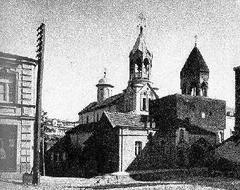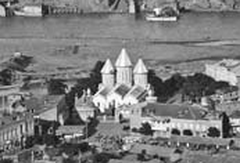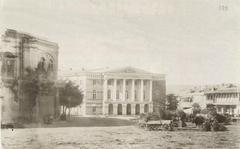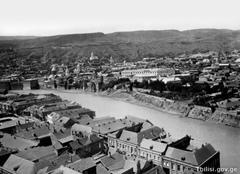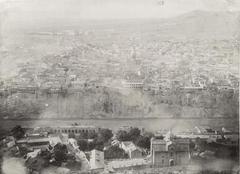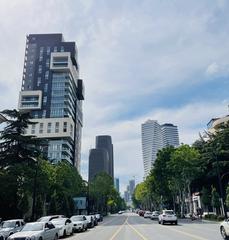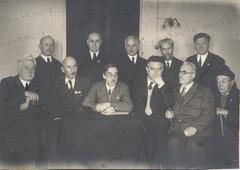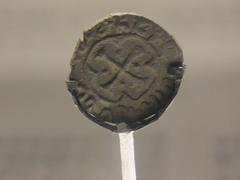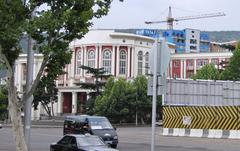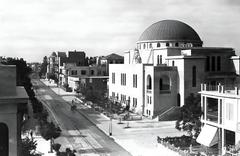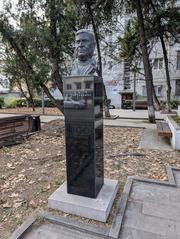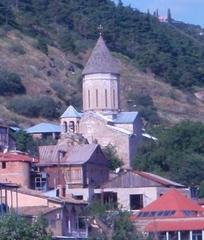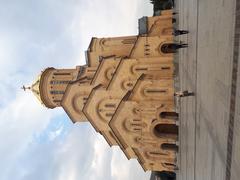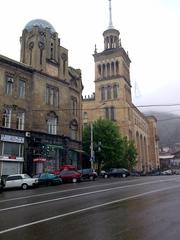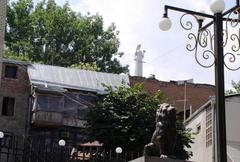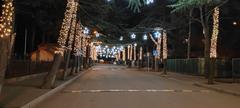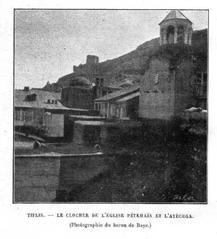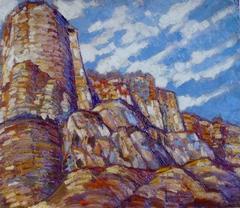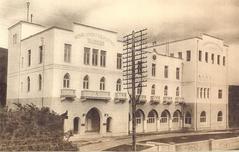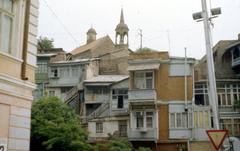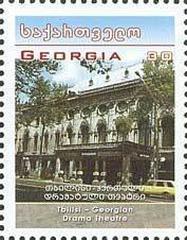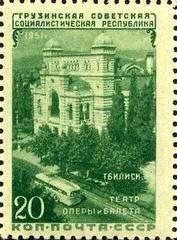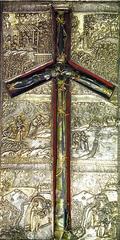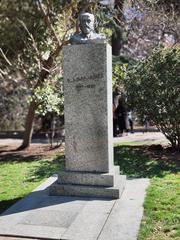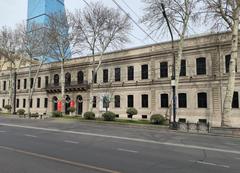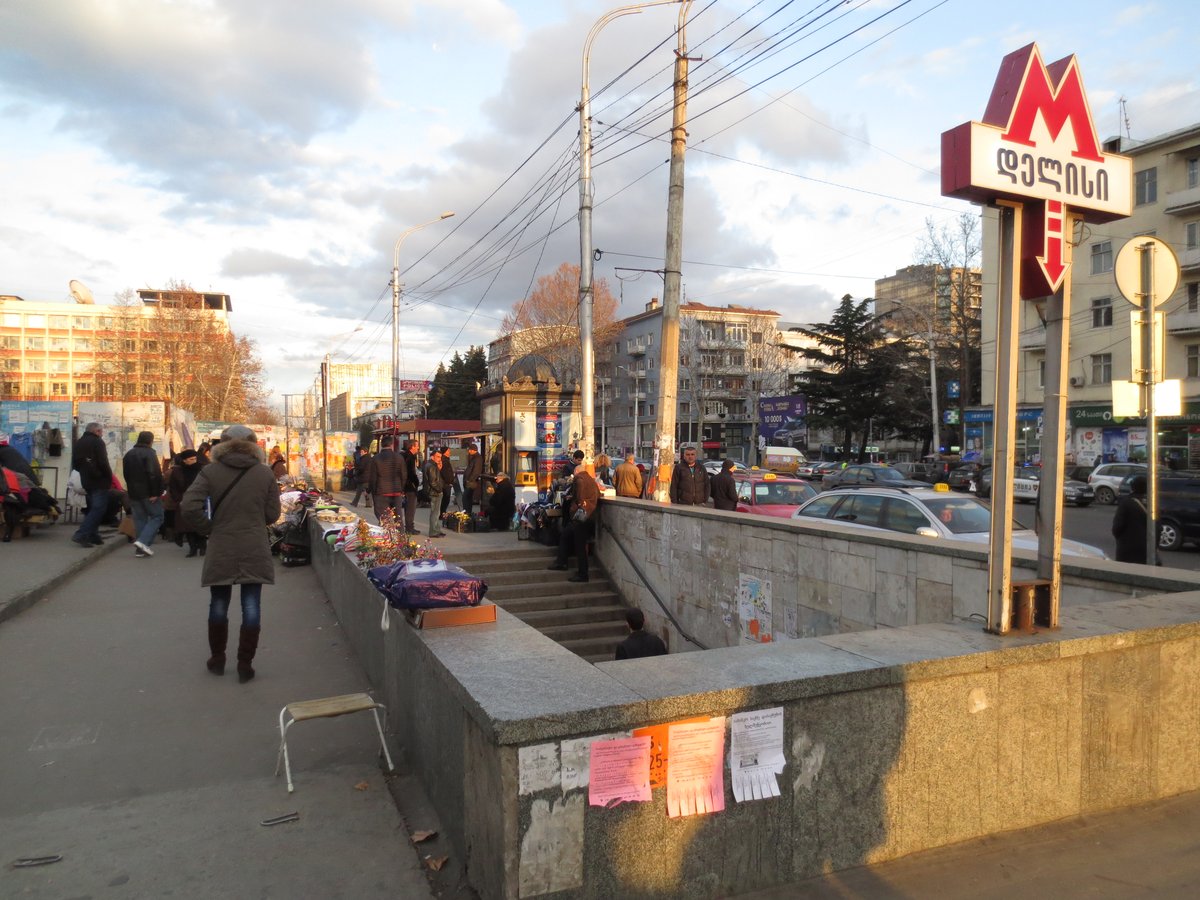
Delisi Tbilisi Georgia: Visiting Hours, Tickets, and Historical Sites Guide
Date: 04/07/2025
Introduction
Delisi is a dynamic neighborhood nestled within the Saburtalo district of Tbilisi, Georgia’s capital. Often overlooked by visitors in favor of the city’s Old Town, Delisi offers a compelling mix of ancient archaeological significance, Soviet-era architecture, and lively modern culture. With easy metro access, affordable accommodation, and a vibrant local scene, Delisi stands as an authentic window into Tbilisi’s layered identity. This guide explores Delisi’s history, main attractions, visiting information, practical tips, and resources to help you plan a rewarding experience in this distinctive district.
For more on Soviet architecture in Delisi, see Reinis Fischer’s Brutal Tours. To navigate Tbilisi’s metro and attractions, consult Tbilisi Metro and Tbilisi Tourism.
Table of Contents
- Discover Delisi: A Unique District in Tbilisi
- Brief History of Delisi
- Key Attractions and Things to Do
- Visitor Information
- Tips for Visitors
- FAQs
- Exploring Delisi: History, Urban Planning, and Community Life
- Nearby Parks and Lakes
- Cultural and Religious Landmarks
- Dining, Nightlife, and Events
- Practical Travel Tips
- Unique Experiences and Day Trips
- Summary and Encouragement to Explore
- References
Discover Delisi: A Unique District in Tbilisi
Delisi is a fascinating residential neighborhood in Tbilisi’s Saburtalo district. It is celebrated for its archaeological heritage, striking Soviet-style architecture, and modern local life. With convenient metro connections, green spaces, and a welcoming community, Delisi offers a refreshing alternative to Tbilisi’s more touristy areas.
Brief History of Delisi
Delisi’s roots stretch back over 4,000 years. Archaeological digs have revealed some of the world’s earliest tinned bronze artifacts, including a notable bronze buckle decorated with a horse rider motif. While Delisi lacks medieval churches or fortresses, its prehistoric finds and Soviet-era transformation provide rich ground for history enthusiasts (Reinis Fischer).
In the 20th century, Delisi evolved from rural land into a prominent urban district. The construction of large residential blocks and the Delisi Metro Station in 1979 integrated it into Tbilisi’s expanding urban fabric, leaving a lasting imprint on the district’s landscape and social life.
Key Attractions and Things to Do
Soviet-Era Architecture
Stroll through Delisi’s distinctive neighborhoods to see classic brutalist apartment complexes, geometric concrete designs, and communal courtyards—iconic examples of Soviet urban planning. These sites attract photographers and history buffs interested in post-war architecture.
Delisi Metro Station
Opened in 1979, Delisi Metro Station is both a practical transport hub and an architectural landmark, typical of Soviet-era metro design. It offers fast access to central Tbilisi and other districts.
Sports and Recreation Facilities
The nearby Mikheil Meskhi Stadium and Olympic Palace host major sporting events and concerts, making Delisi a convenient location for fans and event-goers.
Parks and Green Spaces
Delisi features several leafy parks and playgrounds, ideal for relaxation, jogging, or socializing with local families.
Local Cafes and Markets
Around the metro station and along Saburtalo Avenue, you’ll find a variety of Georgian bakeries, markets, and casual eateries serving local cuisine and fresh produce.
Visitor Information
Visiting Hours
Delisi is open to visitors year-round. The metro operates daily from approximately 6:00 AM to midnight. Parks and public spaces are generally accessible from early morning until dusk.
Tickets and Fees
- Neighborhood: No entry fees required.
- Metro tickets: ~0.50–1 GEL per ride, available at stations (Tbilisi Metro).
- Nearby museums/attractions: Fees may apply (e.g., Open Air Museum of Ethnography charges ~5 GEL).
Guided Tours and Accessibility
While Delisi is not a classic tourist site with formal tours, several guides offer walks focused on Soviet architecture and urban history (Reinis Fischer). The metro and main streets are generally accessible, though some older buildings may lack ramps or elevators.
Getting There
Delisi is served by the Delisi Metro Station on the Saburtalo (green) line, buses, and affordable taxis (use Bolt or Yandex Go for reliability).
Tips for Visitors
- Combine Delisi with Saburtalo for a broader urban experience.
- Bring a camera for architectural photography.
- Try local eateries for authentic Georgian food.
- Visit nearby parks and lakes for nature and recreation.
- Check event listings for concerts or festivals in the area.
Frequently Asked Questions (FAQ)
Q: Are there museums in Delisi?
A: Artifacts from Delisi’s archaeological sites are displayed at Tbilisi’s national museums.
Q: Is Delisi safe for tourists?
A: Yes. Standard city safety measures apply.
Q: Can I enter the residential buildings?
A: You may view and photograph exteriors and courtyards, but interiors are private.
Q: Are guided tours available?
A: Some tours cover Delisi, especially those focused on architecture (Reinis Fischer).
Exploring Delisi: History, Urban Planning, and Community Life
Delisi’s development is emblematic of Tbilisi’s post-Soviet transformation. Built during the 1970s-80s urban expansion, it features large apartment blocks, wide boulevards, and communal green spaces—hallmarks of Soviet planning (Academia.edu).
Following independence, Delisi witnessed demographic and infrastructural shifts, with new commercial centers and a diverse community of long-term residents, students, and expatriates. The area is known for its affordable housing, vibrant student population (proximity to Tbilisi State Medical University), and convenient transit links (Tour Guide Georgia).
Green spaces and community events foster quality of life and cultural continuity. Local cafes, markets, religious, and educational institutions anchor neighborhood life (Secret Attractions).
Nearby Parks and Lakes
Vake Park
One of Tbilisi’s largest parks, open daily 7:00 AM–10:00 PM, free entry. Features walking paths, playgrounds, and connects to Turtle Lake (Travelness).
Turtle Lake (Kus Tba)
Scenic lake with walking trails, cafes, and water activities. Open 8:00 AM–9:00 PM, no fee (Salt in Our Hair).
Lisi Lake
Accessible year-round, Lisi Lake offers a 3.5 km walking/cycling path and birdwatching—no admission fee (Travelness).
Cultural and Religious Landmarks
The Chronicle of Georgia
Impressive monument with 16 massive pillars depicting Georgian history. Open 24/7, free entry (Salt in Our Hair).
Open Air Museum of Ethnography
Showcases traditional Georgian houses. Open Tue–Sun, 10:00 AM–6:00 PM, ~5 GEL entry (MakeMyTrip).
St. Nino Church
Modern Orthodox church, open daily 8:00 AM–7:00 PM, free.
Holy Trinity Cathedral (Sameba)
Georgia’s largest cathedral; open daily 9:00 AM–8:00 PM, free admission (MakeMyTrip).
Dining, Nightlife, and Events
Delisi and Saburtalo offer diverse dining, from traditional bakeries to wine bars and international restaurants. The area’s relaxed, leafy avenues are ideal for evening strolls. Festivals like Tbilisoba (October) and summer community events are easily accessible (TravelPander; AllEvents).
Practical Travel Tips
- Transport: Use the metro for fast, affordable travel. Buses and taxis supplement access (Tbilisi Transport Official Site).
- Accommodation: Options include apartments and guesthouses, often cheaper than city center hotels.
- Language: Georgian is official; English and Russian are common in service sectors.
- Money: Georgian Lari (GEL) is local currency. Cash and cards are widely accepted.
- Safety: Delisi is considered safe; standard urban precautions suffice.
- Connectivity: Free Wi-Fi in cafes/hotels. Local SIMs available.
- Accessibility: Metro and main streets are accessible; some older buildings may not be.
Unique Experiences and Day Trips
- Explore hidden courtyards for traditional Georgian urban life (MyWanderlust).
- Join Soviet architecture walking tours (TripUnlocked).
- Visit local bakeries for fresh traditional bread.
- Day trips to Mtskheta or Gori are easy via metro and marshrutka from Didube station.
Summary and Encouragement to Explore
Delisi is a multifaceted district offering a rare perspective on Tbilisi’s ancient past, Soviet legacy, and evolving urban culture. Its blend of history, architecture, green spaces, and community life, combined with affordable accommodation and convenient transit, makes it an enriching destination. For travelers eager to move beyond the Old Town, Delisi promises a genuine and memorable Georgian experience.
Download the Audiala app for the latest guides and tips, and consult Tbilisi Tourism and Reinis Fischer’s Brutal Tours for more ways to deepen your visit.
References
- Reinis Fischer’s Brutal Tours - Explore Soviet Georgian Architecture in Tbilisi
- Tbilisi Urban Transformation (Academia.edu)
- Wander-Lush: Tbilisi City Guide Book
- Tbilisi Transport Official Site
- Travelness: Best Places to Visit in Tbilisi
- Salt in Our Hair: Tbilisi, Georgia Travel Guide
- MakeMyTrip: Places to Visit in Tbilisi
- Secret Attractions: Tbilisi Unexplored Neighborhoods
- Forbes Georgia: The New Wave at Tbilisi Sea
- Tour Guide Georgia: Guide to Tbilisi Districts
- MyWanderlust: Tbilisi Travel Guide
- TripUnlocked: Tbilisi Tips & What to Do
- AllEvents: Tbilisi Events This Weekend
- TravelPander: Capital of Georgia

